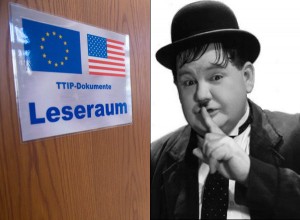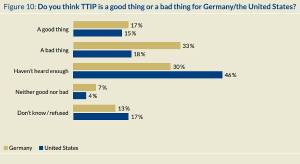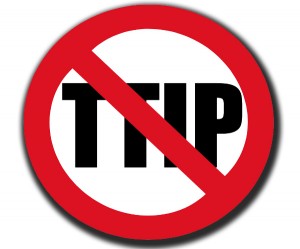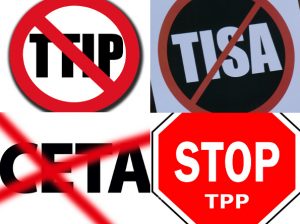What we’d like to see happen with UK trade deals after the Brexit vote

Here is a list, agreed by anti-TTIP activists, of what we want / don’t want in any UK trade deals, whether EU or new UK deals.
Below the list is is some background – including an explanation of the current situation for EU deals.
—————————————————————————————————————–
UK trade agreements: What we want in regard to any trade agreements to which the the UK is a party, whether currently negotiated EU trade agenda deals or new UK deals
We call on the Prime Minister and the leader of the Opposition –
1) To ensure that negotiations for any UK trade deals:
a) exclude any form of investor state dispute settlement (ISDS gives corporations rights to sue governments in private courts);
b) explicitly exclude all public services;
c) exclude financial deregulation from the scope of any trade agreement, recognising that the global financial crisis was precipitated by financial deregulation and that the regulating of this industry must never be limited by trade deal commitments;
d) completely protect the rights of all levels of government to regulate in the public interest in the UK and in the trading partner states;
e) completely protect governments’ public procurement from enforced liberalisation that prioritises the rights of access of transnational investors over local and national development;
f) protect labour rights, human rights, digital rights and the environment, with effective enforceability mechanisms against corporations and states that fail to respect those rights;
g) maintain the primacy of the precautionary principle in respect of public health and safety and disallow any lowering of food, chemical or other health and safety standards, overtly or covertly for the purpose of trade deals;
h) ensure the legal primacy of climate change commitments and measures over trade agreement energy liberalisation commitments and investor rights.
and also –
2) To reject CETA, TTIP, and any other current EU trade agreements which fail to comply with these listed elements and to oppose the provisional implementation of any such deals.
——————————————————————————————————————————
The UK’s trade agreements
There is a great deal of high level public discussion of how quickly the UK will be able to negotiate trade deals with the EU, with other countries and with particularly ‘significant’ trading partners.
Yet people who are aware of what is in the EU’s current deals in which the UK has been, and still is, included, know the dangers of such international trade treaties.
There is little public recognition that the UK will still be in the EU’s current deals if in the EU when deals are fully or provisionally implemented.
This is very likely with CETA (EU/Canada Comprehensive Economic and Trade Agreement) and the EU/Singapore free trade agreement and possibly TTIP (US/EU Transatlantic Trade and Investment Partnership).
Although the UK will exit these agreements at the point when we leave the EU, we will have ongoing liabilities for some years after.
With CETA, the European Commission has conceded mixed competency rather than claiming sole Commission competency. Therefore member state parliaments will need to ratify the deal before it can be fully implemented.
However the Commission has also proposed interim provisional implementation. In effect, this means actioning the deal before member state parliaments have ratified CETA or had the chance to veto it, and there is no EU procedure for reversing provisional implementation.
Meanwhile, a decision of the European Court of Justice on whether the EU/Singapore agreement is solely Commission competency or ‘mixed’ competency is pending, expected early next year.
Sole Commission competency would allow for full implementation after the European Council (member state governments) agrees to it, though probably delayed until the European Parliament has also given assent. A legal judgement for ‘mixed competency’ will require ratification by member state parliaments, and there would be provisional implementation.
The Commission’s framing of its proposal on CETA conceded mixed competency but on political rather than any legal grounds. If the Court decides that EU/Singapore is solely Commission competence, the Commission, having got the CETA proposal through the European Council on the basis of ‘mixed‘ and ‘provisional’, may then attempt to switch to sole competency and full implementation, avoiding resistance from member state parliaments.
The timing makes it very likely that the UK will be in the EU when at least CETA is implemented.
With provisional implementation, this is likely to entail a three year UK liability on leaving, including ISDS. If fully implemented, the CETA ‘stabilisation clause’ may mean a 20 year period of overhanging liability.
The expectation is that the UK government will maximise its continuing membership status to push the current EU deals ahead.
At the same time, the UK is looking to sign its own trade agreements, including its trading arrangements with the EU.
The impression created by the media during the referendum campaign and since is that trade deals are highly desirable without reference to the very dangerous elements.
Now is the time to assert a positive agenda for any trade agreements in which the UK is involved, both EU and new UK deals, as part of an overall positive Brexit agenda of what is possible outside of the EU.
The list above outlines what we think is essential for any trade agreements in which the UK is involved.
This can potentially:
– make clear to policy makers and those who can affect policy what is not acceptable in any UK trade deals
– raise public awareness of the dangers inherent in so-called ‘trade deals’
– avoid the complexity of awareness-raising via separate trade deals and their acronyms
Join us – Stop TTIP UK
The views expressed in our blog are those of the author and not necessarily lowimpact.org's




 Read this German MP’s account of the TTIP reading room and decide what you think about TTIP ‘transparency’
Read this German MP’s account of the TTIP reading room and decide what you think about TTIP ‘transparency’
 Public support for TTIP has plummeted in Germany and the US to 17% and 15% respectively
Public support for TTIP has plummeted in Germany and the US to 17% and 15% respectively
 Ha Joon Chang: ‘increasing corporate power is at the heart of TTIP’
Ha Joon Chang: ‘increasing corporate power is at the heart of TTIP’
 Brexit or no Brexit – so-called ‘trade’ deals still threaten our NHS
Brexit or no Brexit – so-called ‘trade’ deals still threaten our NHS
 What’s the current situation as regards TTIP, TPP, CETA, TiSA, and what’s the future for trade deals?
What’s the current situation as regards TTIP, TPP, CETA, TiSA, and what’s the future for trade deals?
 Can you offer your IT skills to help build a website to challenge the pro-corporate bias in UK trade deals?
Can you offer your IT skills to help build a website to challenge the pro-corporate bias in UK trade deals?
 Commons economy
Commons economy
 The 'democracy problem'
The 'democracy problem'


